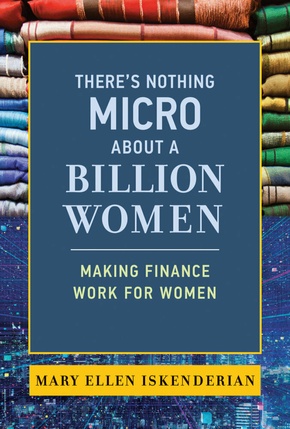
There's Nothing Micro about a Billion Women - Making Finance Work for Women
| Verlag | MIT Press |
| Auflage | 2022 |
| Seiten | 232 |
| Format | 16,0 x 2,0 x 23,4 cm |
| Gewicht | 485 g |
| Artikeltyp | Englisches Buch |
| EAN | 9780262046442 |
| Bestell-Nr | 26204644EA |
Why it takes more than microloans to empower women and promote sustainable, inclusive economic growth.
Nearly one billion women have been completely excluded from the formal financial system. Without even a bank account in their own names, they lack the basic services that most of us take for granted secure ways to save money, pay bills, and get credit. Exclusion from the formal financial system means they are economic outsiders, unable to benefit from, or contribute to, economic growth. Microfinance has been hailed as an economic lifeline for women in developing countries but, as Mary Ellen Iskenderian shows in this book, it takes more than microloans to empower women and promote sustainable, inclusive economic growth.
Iskenderian, who leads a nonprofit that works to give women access to the financial system, argues that the banking industry should view these one billion unbanked women not as charity cases but as a business opportunity: a lucrative new market of small business owners, heads of households, and purchasers of financial products and services. Iskenderian shows how financial inclusion can be transformative for the lives of women in developing countries, describing, among other things, the informal moneylenders and savings clubs that women have relied on, the need for both financial and digital literacy (and access) as mobile phones become a means of banking, and the importance of women s property rights. She goes on to make the business case for financial inclusion, exploring the ways that financial institutions are adapting to help women build wealth, access capital, and manage risks. Banks can do the right thing and make money while doing so and all of us can benefit.
Inhaltsverzeichnis:
Preface vii
Introduction xi
Part I: Women's Financial Inclusion: Clearing the Roadblocks to Empowerment 1
1 The Road to Financial Inclusion 5
2 What's Standing in the Way of Women's Financial Inclusion? 33
3 From Invisibility to Agency 55
Part II: Making the Business Case 73
4 Making the Business Case for Building Wealth 77
5 Making the Business Case for Access to Capital 101
6 Making the Business Case for Managing Risk 129
7 A Call to Action 141
Acknowledgments 161
Notes 163
Index 201
Rezension:
Included in McKinsey's 2023 Summer Reading Guide
"A comprehensive look at how to bring more women into the global financial system... The book s holistic approach to financial inclusion addressing insurance along with the ability to save and borrow and drawing connections between financial empowerment and gender-based violence adds a valuable layer to the discussion and expands on the existing literature... An engaging and wide-ranging look at new developments in banking access."
Kirkus Reviews
"Drawing on years of professional investment banking experience, Iskenderian s thought-provoking business guide walks readers through the obstacles to inclusion and financial independence that women often face... Iskenderian offers a call-to-action for governments and financial institutions to make policies and products that better serve the needs of low-income women and women-owned businesses, especially in developing nations."
BookLife
"There s Nothing Micro a bout a Billion Women offers real-life examples, case studies, and research that demonstrate how stakeholders can come together to create a more gender-inclusive financial system, which would deeply affect the lives of many women around the world and communities and economies for the better."
Philanthropy News Digest
"Mary Ellen Iskenderian masterfully explains that women need a lot more than just a loan to be included in formal society. She positions the billion women who are not a part of the formal system as an opportunity for the financial world rather than as victims of charity. The key is not to show sympathy to women but to include them in the financial system."
McKinsey
